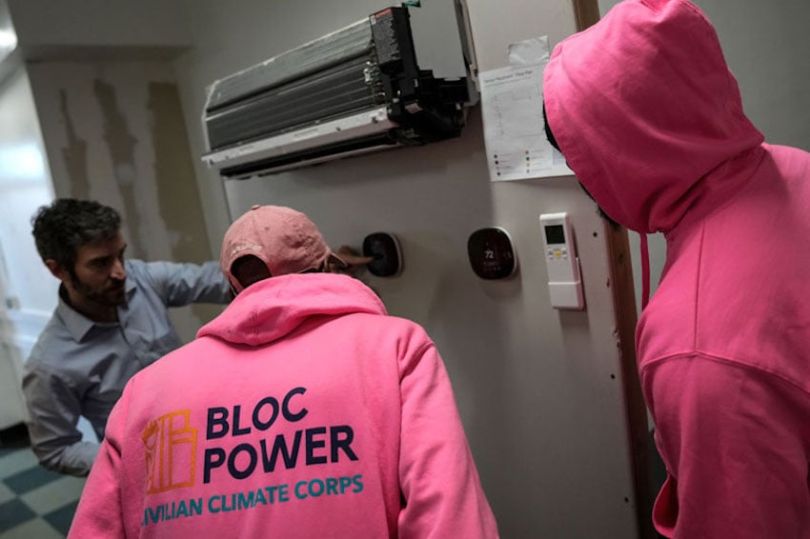
Brooklyn-based BlocPower has installed green energy upgrades in more than 5,000 buildings in urban areas since 2014. Now, with the help of new equity funding and energy rebates, the company is poised to take its decarbonization efforts to the next level.
On Thursday, the greentech company announced it would scale its green energy improvement efforts, advance its SaaS platform and broaden its workforce development efforts with $24 million in Series B financing and $130 million in debt financing.
“Since 2014, BlocPower has focused on decarbonizing America’s urban core, developing the green economy’s workforce and bringing climate justice to underserved and vulnerable communities,” BlocPower founder and CEO Donnel Baird said in a statement. “We are fighting the climate crisis while improving quality of life for city residents.”
Led by VoLo Earth Ventures and joined by Microsoft Climate Innovation Fund, basketball star Russel Westbrook and other investors, this Series B financing comes two years after BlocPower’s Series A round, which brought in $8 million in equity funding and $55 million in debt financing.
The Series B comes just in time for BlocPower to take advantage of the green energy tax rebates in the federal Inflation Reduction Act signed by President Joe Biden in August. That legislation, which Biden called the “most aggressive” climate action in the country’s history, allocated $369 billion for climate action with the goal of reducing carbon emissions by 40 percent by 2030.
“We will help low-to-moderate income communities to access the benefits of President Biden’s once-in-a-lifetime green economy investments,” Baird said.
BlocPower said it has grown its revenue by 4,000 percent since its Series A round and has landed city-scale decarbonization projects in Ithaca and Menlo Park, California. The company is also working on large-scale green energy improvement projects in Denver, San Jose, Buffalo, Atlanta and San Luis Obispo, California.
BlocPower’s green energy projects, which are installed by workers from neighborhoods most impacted by gun violence, can include new electrical panels, insulation or replacing furnaces and air conditioners with a heating and cooling system that does not require fossil fuels.
The company will also grow its SaaS product, called BlocMaps. This product uses building and environmental justice data to help urban cities and utility companies across the U.S. create a decarbonization plan for their city. These plans can detail which buildings are in need of green energy improvements, as well as the cost savings, carbon reduction and job creation data for making those upgrades. BlocMaps is now used in NYC, Chicago, Ithaca and San Luis Obispo.
BlocPower is also growing its NYC Civilian Climate Corps program, which teaches people from underserved neighborhoods how to install green energy appliances. The program received a two-year, $180 million contract from the city of New York last year to train 3,000 NYC residents for clean energy jobs. BlocPower recently opened two workforce training facilities in Brooklyn and the Bronx to support the growing program.
“Whenever someone wants to make a change or do something new, nothing is guaranteed to turn out according to best-laid plans. You can’t make an omelet without breaking eggs,” Baird said. “You can’t renovate a home without dust and mess, and sometimes lead, mold and asbestos. We go into low-income communities to finance and upgrade 100-year-old buildings — and sometimes we run into 100-year-old surprises lurking in the walls or hiding in the basement. But I’m proud that at BlocPower, we always finish what we start and we clean up messes.”




